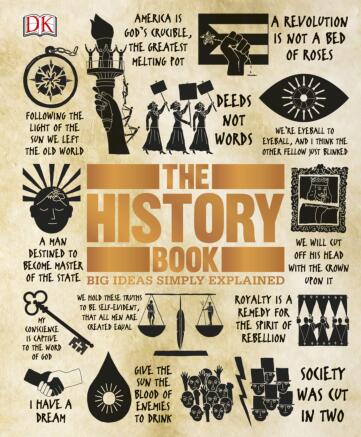THE HISTORY BOOK 内容简介
From at the beginning of the birth of civilization to culture rapid development today, the DK historical encyclopedia "takes you through those far-reaching event in history, let you appreciate the wisdom of every period of history behind. From the code of hammurabi to the Renaissance, to the American war of independence, the second world war, a routine, and then history will show graphically in front of your eyes. Concise with diagrams and beautiful pictures will be important in the history of the concept and theme of interpretation. As far as Caesar, close to President Obama, in the history of the famous leaders, thinkers, and important people's life will unfold before your eyes, let you to in-depth insight into the historical event that causes the world change. Whether you have a passion for the student of history, or scholars studies assiduously, please carefully read the contents of the, you will benefit a lot.
THE HISTORY BOOK 精彩文摘
Human Origin (200,000 years ago - 3500 B.C.)
It is generally believed that man originated from the African continent. Through biological evolution and natural selection, humans and their close relatives, chimpanzees, have undergone millions of years of evolution in East Africa. Homo sapiens, or modern humans, have evolved through the same biological processes as other peoples, including Neanderthals, who died out 40,000 years ago.
Around 100,000 years ago, humans who lived on hunting and foraging were almost the same as other apes. However, from a certain moment (it is difficult to determine the exact moment), their body began to change, such a change is not the evolution of biology, but the evolution of culture. They have gradually changed their way of life by means of tool making, artistic creation, belief, social customs and the establishment of language system. By the time they were able to draw beautiful pictures on the walls of caves and carve statues from stones or bones, humans had emerged from other animals. At the beginning, human evolution was extremely slow, but this process gained a strong momentum of development over the next millennium. In this way, human beings have become the only animals with a long history.
Exploring History
For historians, how human culture and society developed in the early stage is a particularly difficult issue. The earliest words appeared about 5000 years ago, and at that time, mankind has gone through a long historical period. Generally speaking, people will call the period before the writing appeared "prehistoric" and will not discuss it, because this period did not leave any data for historians to study. However, in recent years, many new scientific methods (including genetic material identification and radiocarbon dating) have enriched the existing archaeological means, enabling scholars to fill in the gaps in the history before the emergence of the text, even if only a little.
New research and exploration have brought people different perspectives (although the findings of these studies are often controversial), so the narrative of ancient history in the literature is constantly being revised. Even the discovery of a cave, a mausoleum, or even a human skull raises questions about whether there were fallacies in one's previous knowledge. However, in the 21st century, most of the records of early human beings in historical documents have been confirmed.
Hunters and Collectors of Nomadic Nationalities
Historians agree that 12,000 years ago, humans lived a small-scale nomadic life, using stone tools and hunting and gathering for a living. This period is often called the Paleolithic Age. Human beings are undoubtedly successful as a species. They have multiplied their population to tens of millions and spread their footprints to most parts of the earth. Usually, they are well adapted to the major natural climate changes that have taken place over tens of millions of years, although during the coldest "Great Freeze" period, humans fled briefly from places such as Britain and Scandinavia in the north.
There is a close connection between human existence and the natural environment in which they live. However, even at that time, their influence on the environment was by no means positive. Historically, there was a disturbing coincidence that where human hunters went, giant animals such as mammoths and mastodons began to die out. Although human hunting is by no means the only cause of the extinction of these animals (natural climate change is one of the factors), it is not a good tradition from our point of view today.
Planting Revolution
There seems to be a lot of merit in this hunting and gathering way of life derived from "natural" human beings. Scientists studied the skeletons of humans in early hunter-gatherer societies and found that our ancestors usually had little effort to get enough food, and they hardly got sick. If that is the case, then why did people all over the world gradually settle in villages and towns, depend on agriculture for their livelihood, grow grains and raise livestock? After all, the work of farming is too heavy, and the epidemic first spread from villages and towns.
No matter how human settlements and agricultural development affected people's quality of life at that time, there is no doubt that this greatly increased population density. Some people call this period the "Neolithic Age", which is a major turning point in the course of human development. The earliest towns and cities were born at this time, and the initial "civilization" was established at this time.

→→→→→→→→→→→→→→→→→→→→查找获取




评论